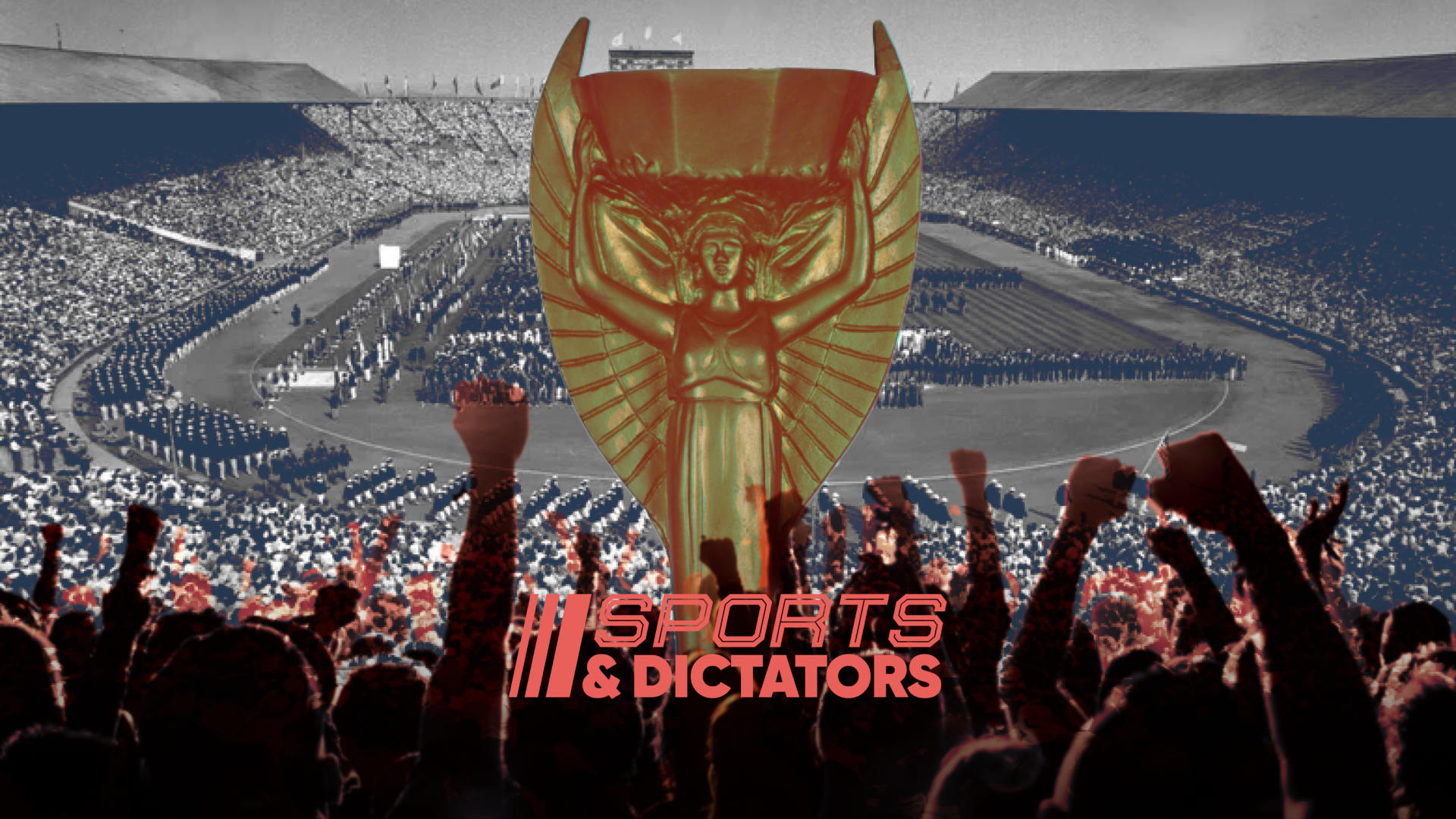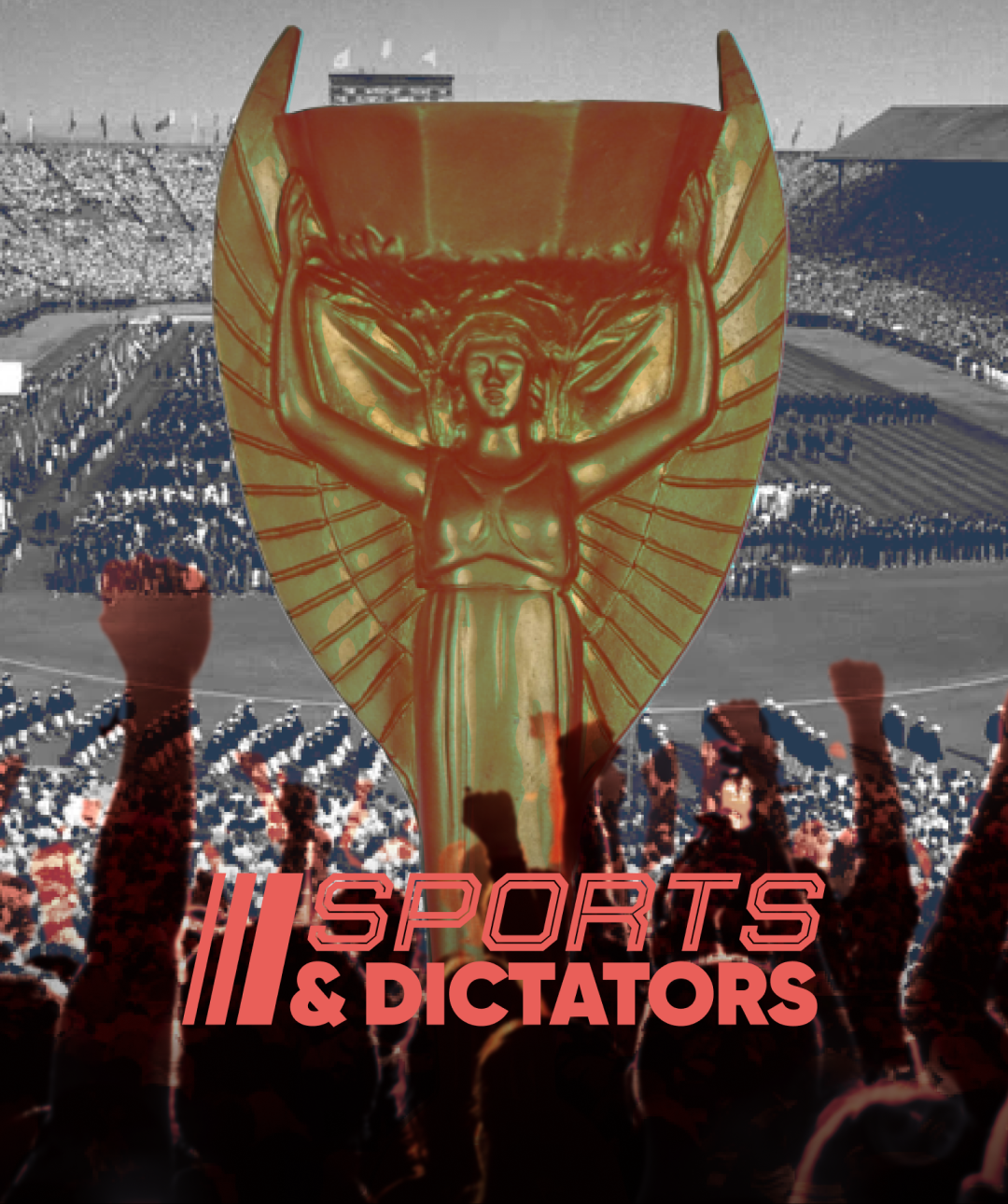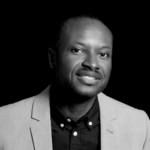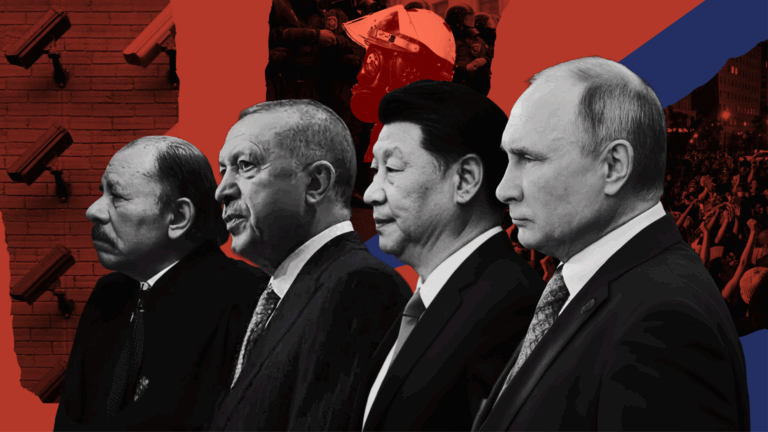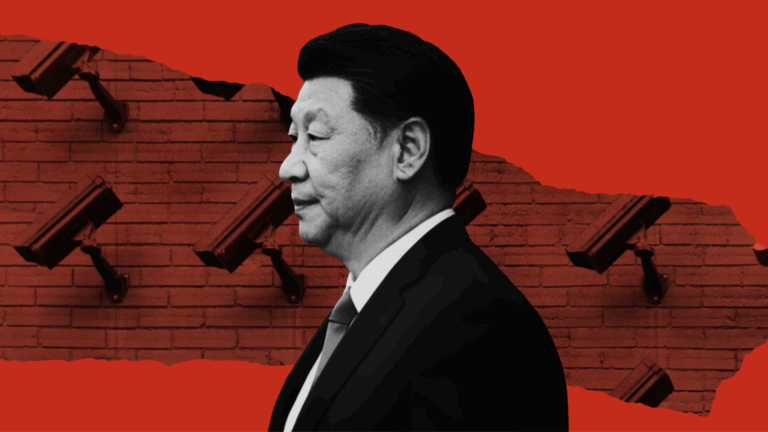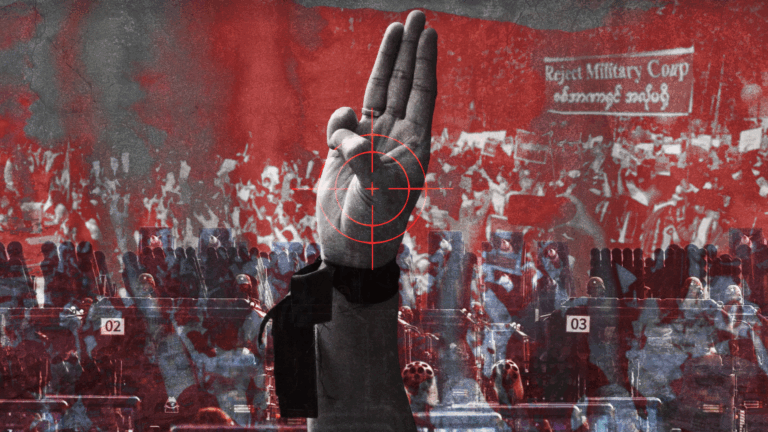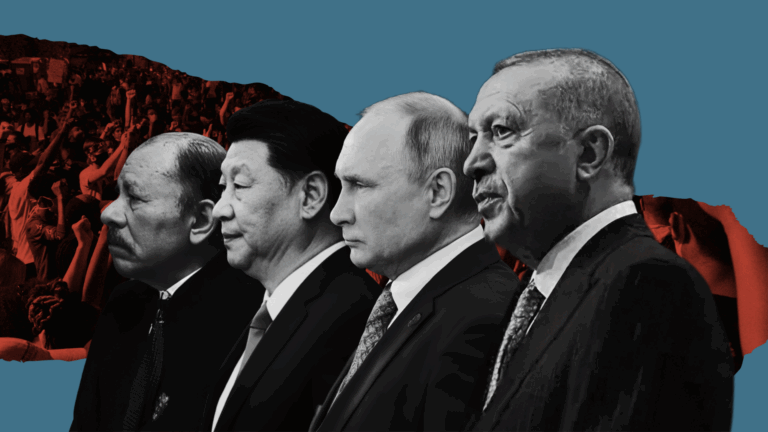Long before the inception of the Olympic Games in Ancient Greece, sports have been used to distract the masses, test foreign policies, thaw diplomatic tensions, and broadcast political and social messaging. In the modern era, authoritarian regimes have tapped into the popularity of sports within popular culture to manipulate domestic and global perceptions as a form of sophisticated soft power strategy.
This four-part series will delve into the history of dictators’ weaponization of sports for political indoctrination, national consensus, the distraction of the masses, global projection of soft power and prestige, and international diplomacy, analyzing its ancient roots, its popularity among dictators in the 20th century, and its modern evolution.
This piece looks at how some of the 20th century’s worst human rights abusers secured the hosting or sponsorship of some of the most prestigious international sporting events of their time, often through controversial backroom dealing, lobbying, and politically charged decisions of sports governing bodies that operate above any accountability and with little transparency.
Franco’s Football: Spanish nationalism and diplomacy
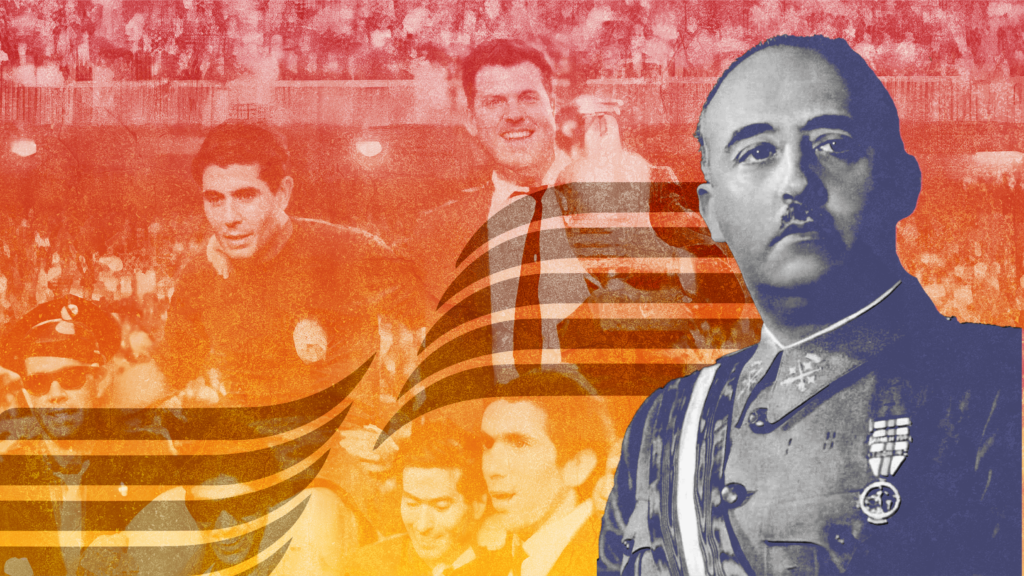
The aftermath of World War II left Europe with one surviving fascist dictator: General Francisco Franco, who had prevailed in the Spanish Civil War with the military support of Hitler and Mussolini.
Following the Civil War, In 1941, the dictator established by decree a state institution called the Delegación Nacional de Deportes, which brought all sporting activities and institutions — including Spain’s National Olympic Committee — under the control of his one-party totalitarian regime. The decree characterized sports as “one of the main instruments for the complete education of the Spanish man” and the ruling FET Party as chiefly responsible for “encouraging and directing all forms of sport.” The “Generalissimo” exploited the growing popularity of football as the main national distraction and the public’s yearning for a return to normalcy for his political agenda. Duncan Shaw’s book “Fútbol y Franquismo” quotes Spanish sports journalist Julián García Candau as arguing that televised football matches allowed the Francoist regime to keep citizens off the streets around International Workers Day, which was outlawed under his regime.
Franco sought to impose Castilian Spanish as the lone unitary language across Spain, banning other regional languages. He issued a specific decree ordering football clubs to comply with this. But for people in regions such as Catalunya and the Basque region, football stadiums became the main venues where they could speak their languages, sing songs, and express their cultural identities en masse. In the 1950s, the success of Real Madrid caught the attention of Franco’s regime.
As the madridista club won a string of consecutive European trophies in the 1950s and their trio of stars — Puskás, Di Stéfano, and Gento — became more and more popular outside of Spain, the Francoist regime sought to exploit this success to soften its image and break out of the diplomatic isolation it suffered since the end of WWII. Underscoring this, Franco’s Foreign Affairs Minister Fernando Maria Castiella declared in 1957 that “Real Madrid is a style of sportsmanship. It is the best embassy we have ever had.”
In 1964, Spain hosted the second edition of the UEFA European Championships, then known as the European Nations Cup. The Spanish team, dubbed La Furia, progressed through the knockout tournament and eventually set up a clash with the regime’s political archenemy, the Soviet Union, in the final. Four years earlier, Franco ordered Spain’s team not to travel to Moscow to compete, fearing that the USSR would exploit a poor performance by La Furia for its propaganda against his right-wing dictatorship.
Four years on, Franco agreed to allow Spain to face the USSR in the final and was even in attendance to watch his team win the tournament. In an essay entitled “Football, Diplomacy, and International Relations during Francoism, 1937-1975,” which was published in the book “Soccer Diplomacy,” Juan Antonio Simón writes that “the triumph of the national team strengthened domestic cohesion around the dictator’s image,” with the regime-controlled press “directly relating football achievements with the success attributed to Francoism.” Furthermore, Simón notes that the victory sets off the regime in fully embracing “sporting success and the organization of sporting events as a soft power strategy to influence opinions of the regime abroad.”
Spain’s 1964 victory became a rare moment of sporting glory for the Generalissimo who had seen Spain fail to qualify for the 1954 and 1958 World Cups and perform poorly in the following two World Cups.
Brazil: Pelé and the generals
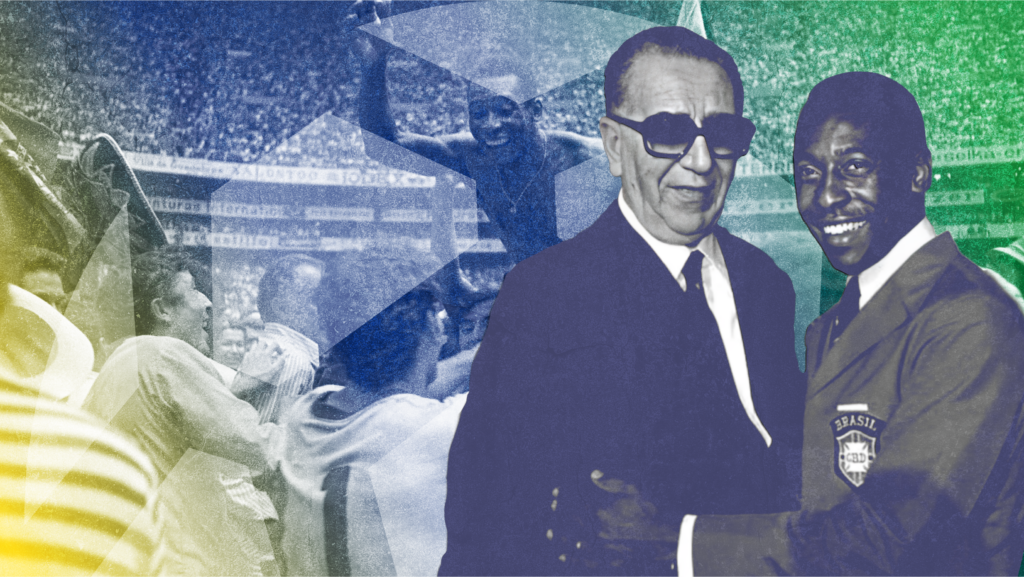
For Brazil, on the other hand, the late 1950s to 1960s were the golden era with the emergence of Pelé, among other stars, and the Seleção winning three out of four FIFA World Cups in a span of 12 years.
Midway through this time, in 1964, the Brazilian military seized power in a coup, plunging the country into a military dictatorship and repression against dissent. In October 1969, General Emílio Garrastazu Médici, a football fanatic who would exert intense political control over Brazilian football. Less than a month in office, Médici summoned Pelé to his office to congratulate the striker on his 1,000th goal. Understanding the power of the optics of tying himself to Pelé’s popularity, Médici turned the event into a grand televised spectacle.
The dictatorship then made winning the 1970 World Cup a top political objective. Médici’s regime pressured Pelé to reverse his earlier decision to not play in the tournament. It also replaced the Brazilian national team’s coach, João Saldanha, after the latter, an outspoken critic of the dictatorship, bravely distributed during a trip to the World Cup draw a dossier detailing 3,000 political prisoners and hundreds of victims of torture and murder by the regime.
Médici capitalized on Brazil’s resounding success, crediting the victory to “the rise of faith in our fight for national development.” The regime turned the team’s World Cup anthem, “Forward Brazil,” into its official song and stamped its slogan (“no one will hold back Brazil now”) on photos of Pelé in action. Four years later, Pelé defied regime pressure to play in the 1974 World Cup in protest of human rights abuses.
“The military tried to force me,” he said in 1999. “But that story about torture made me desist.”
Mobutu’s Zaire: Football, Pelé and ‘the Rumble in the Jungle’
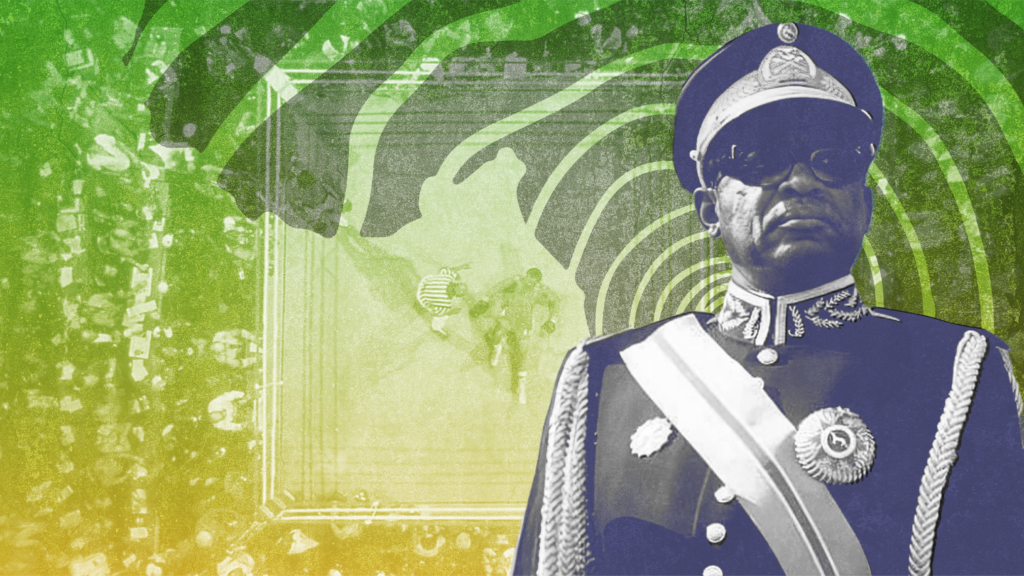
Brazil’s generals were among many dictators around the world who sought photo ops with Pelé. Congo’s dictator Mobutu Sese Seko was one.
In 1967, Mobutu was consolidating a one-party totalitarian regime after staging a coup two years earlier. It was Mobutu’s second coup since he deposed in 1960 the democratically elected government of the independence leader Patrice Lumumba (whom he had executed the following year). Mobutu quickly recognized the power of football to forge national consensus behind his regime and blunt the ethnic and political divisions that produced civil unrest and rebellions from 1960 to 1964 in a disparate country as vast as Western Europe.
The cornerstone of the dictator’s football project was the development of a strong national team, which he personally renamed Les Léopards after his favorite animal. In 1967, Mobutu lured some of the best international football teams to come play exhibition matches against Les Léopards in the Congolese capital Kinshasa, such as Ghana’s national team, Brazilian club Olaria Atlético Clube, and Pelé’s club, Santos F.C. It was a success, as the dictator secured a photo op with Pelé, and Les Léopards were crowned champions of Africa next year. It was a golden era of Congolese football (both clubs and national team) that would stretch until 1974 when Les Léopards won their second Africa Cup of Nations and became the first black African nation to qualify for the FIFA World Cup that year (by that time, Mobutu had renamed the country to Zaire).
But the team performed poorly at the World Cup as a result of players’ protest against the embezzlement of their pay by Mobutu cronies. The corruption was emblematic of Mobutu’s kleptocratic regime: the dictator and his cronies plundered the country’s bountiful mineral wealth, spending the riches on a lavish lifestyle and extravagant vanity projects.
In 1974, the best was yet to come for Mobutu, as boxing promoter Don King was seeking to raise $10 million in prize money for a heavyweight boxing showdown between Muhammad Ali and George Foreman. In the book “Only in America: The Life and Crimes of Don King,” Jack Newfield recounts that Fred Weymar, a Mobutu adviser, approached Hank Schwartz, a member of King’s entourage. “Mobutu wanted to stage an international extravaganza,” Newfied wrote, “to place Zaire on the map, to give him a status advantage over his rival, Idi Amin, in the imaginary contest for leader of the African continent.”
A deal was struck to bring Ali to the Zairean capital, Kinshasa. Mobutu took the $10 million from the public treasury (3% of Zaire’s annual budget), at a time when the Zairean economy was reeling from a sharp drop in the price of copper, the country’s chief export. The deal stipulated that 42% of the profits from the fight (over $50 million) would go directly into Mobutu’s pockets.
The event, famously known as “The Rumble in the Jungle,” is revered by many as “arguably the greatest sporting event of the 20th century.” It held the title of the world’s most-watched live television broadcast during its time, as more than 1 billion people tuned in to watch Ali knockout Foreman in the eighth round. For Mobutu, the fight not only brought photo ops with two famous boxers, funds for his personal coffers, and international prestige, but it also served to defuse rising social discontent with a worsening economy.
Zaireans would bear the brunt of Mobutu’s excess, which eventually bankrupted the country. Barely a year after the “Rumble in the Jungle,” Filipino kleptocratic dictator Ferdinand Marcos followed in the footsteps of Mobutu by sponsoring his own prestige boxing extravaganza with Ali and Joe Frazier, billed “Thrilla in Manilla.” Marcos used the event to convince international opinion that he was not losing grip on the country in the face of growing opposition and a rebel insurgency against his brutal regime.
General Videla and the 1978 World Cup
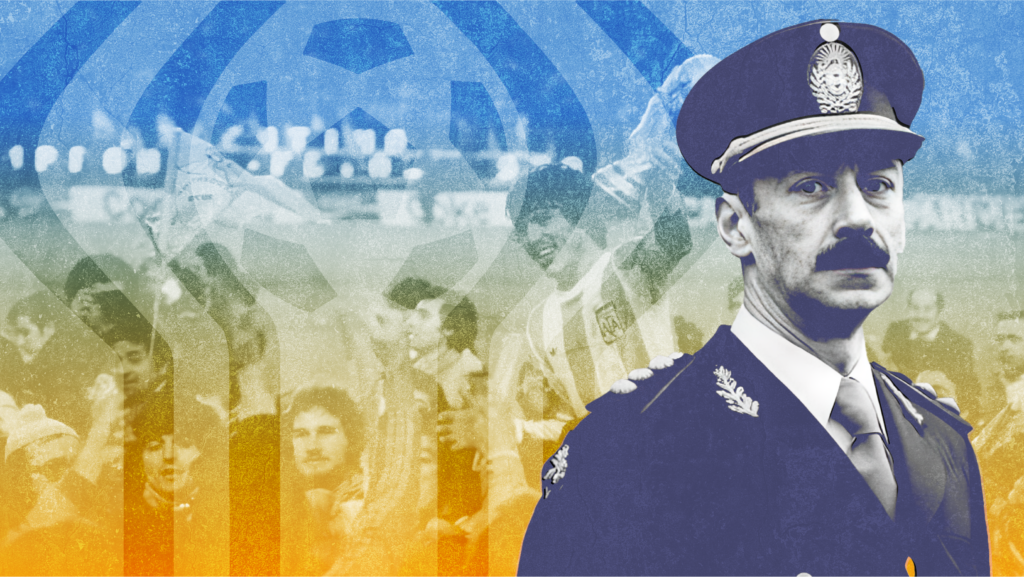
In July 1966, a military coup happened in Argentina, the third in 11 years. A week later, FIFA awarded the hosting rights of the 1978 World Cup to the country.
By 1976, after a short-lived interlude of democracy, another military coup plunged the country into the darkest and bloodiest chapter in modern Argentinian history: Argentina’s “dirty war” in which tens of thousands of people endured torture, murder, and disappearances in the junta’s ruthless campaign against Marxist guerrillas and dissidents generally. Facing criticism, the regime of General Jorge Rafael Videla made the organization of the World Cup a top priority as a convenient public relations smokescreen.
In response to a global boycott campaign and media criticism, the junta invested in advertising and public relations campaigns, involving films, tourism promotion posters, and promotional tours with celebrities such as Argentinian Formula 1 champion Juan Manuel Fangio. FIFA President João Havelange, a Brazilian close to his country’s military regime, ignored protests.
In June 1978 at Buenos Aires’ Monumental Stadium, Videla opened the tournament with a speech about peace and friendship. Predictably, blatant controversies, such as domestic political issues, and allegations of interference and match-fixing marred the tournament in which Argentina triumphed. In a bizarre but telling twist, political prisoners who survived the junta’s dungeons claimed that their torturers encouraged them to cheer for Argentina during matches.
Argentina’s victory gave the relatively new military junta the lifeline it needed, setting back efforts to isolate the regime over its abuses.
Seven years after the contentious World Cup, Videla was found guilty of murder and handed a life sentence.
The exploitation of sports by fascists, dictators, and military leaders to whitewash their reputations and legitimize their authority spans a seemingly infinite spectrum of examples. This practice, persisting into contemporary times, showcases modern autocrats drawing valuable lessons from their predecessors’ mistakes and mastering the strategic deployment of sports as an influential tool for soft power.
The lessons of history underscore that the playing field is not only for athletic prowess but a battleground where autocrats vie for international influence and legitimacy.
Mohamed Keita is a senior policy officer with HRF.


